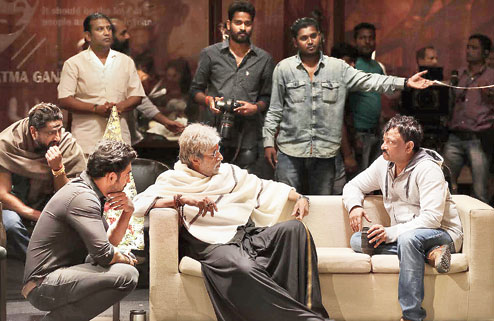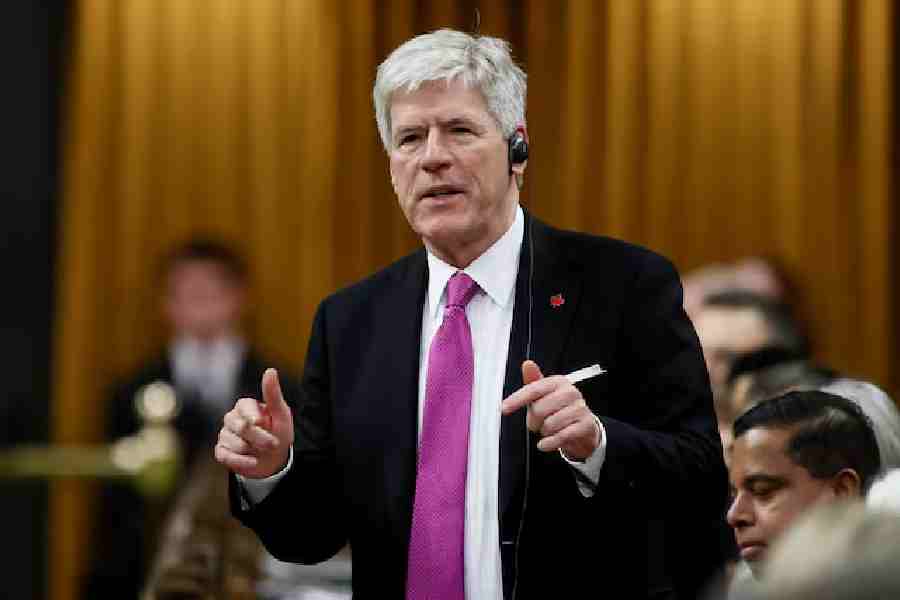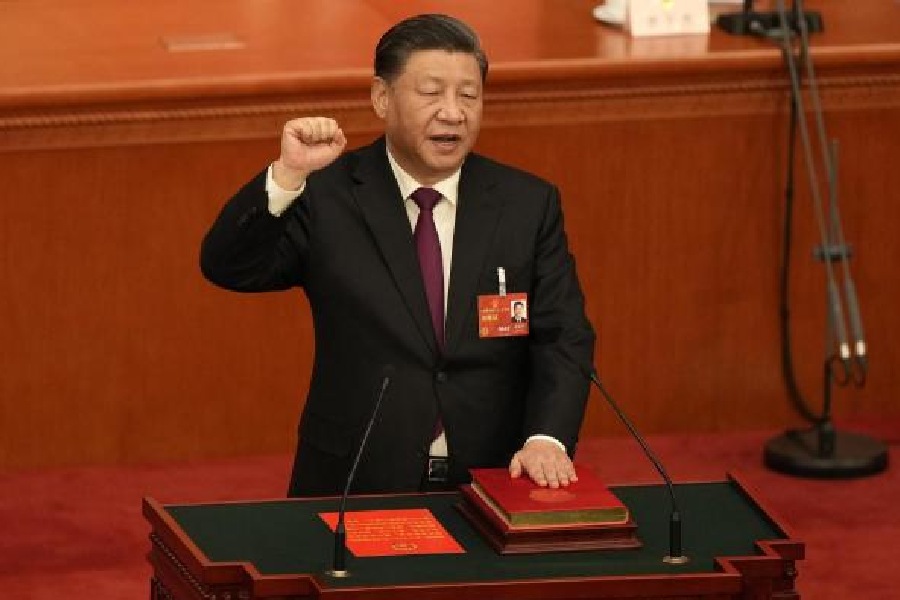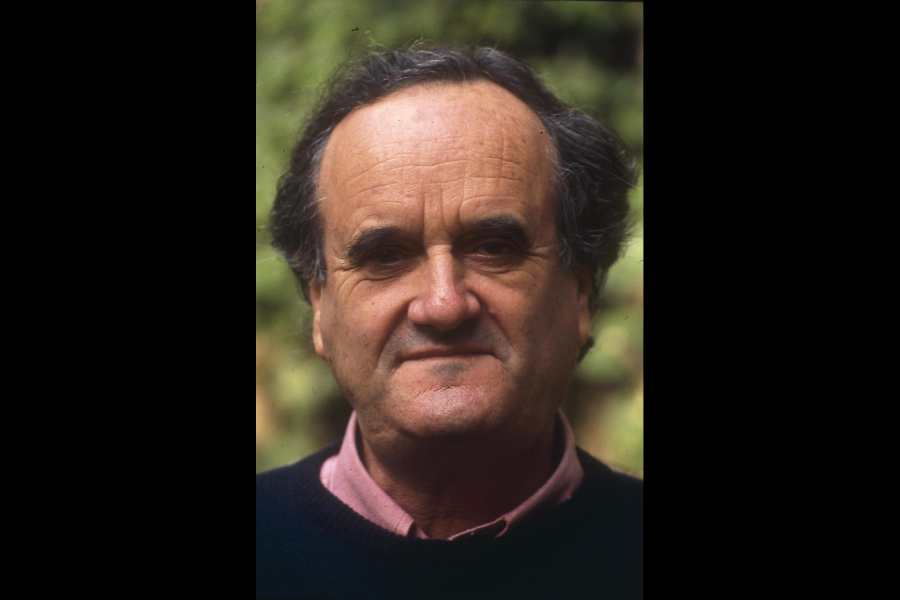
One thing that underlines everything Ram Gopal Varma does is his desire to be provocative. Whether it’s his films, his tweets or his office. The sprawling office in the heart of Bollywood in Andheri (west) is called Company. The steam-punk themed entrance features a giant gun, statue of a voluptuous woman and the word COMPANY written across in giant lettering.

The first image you see when you walk into the office is a full-length poster of Bruce Lee with the caption “I care a f**k ’bout circumstances. I create my own opportunities”. The director takes credit for designing this two-storeyed office space. The board on the door to Ramu’s cabin says ‘Devil’ and the door marked ‘God’ leads to the office of his assistants. On the first level, different doors have names of people who have left a mark on the director’s life. So, there is a Dawood Ibrahim conference room, Tori Black (the porn star) editing room and Donald Trump restroom. Rooms are named after Urmila Matondkar, Narendra Modi (“a very charismatic person”), Ayn Rand, Tughlaq, Nagarjuna, Gandhi and Hitler.
Ramu is proud of his office and you can hear it in his voice as he gives t2 a tour. “No one will decorate an office like this. But I want my space to be a reflection of me. Why would anyone put a gun and sexy girl at the entrance? This is how I have always been. I am not a social person. I don’t have friends or family connections. I don’t take holidays. As a person, I am an oddball,” he says matter-of-factly as we sit down in his massive cabin.

For almost three decades, the 55-year-old has been one of Bollywood’s most prolific and controversial directors. In the ’90s, films like Rangeela and Satya and later Bhoot and Company made him a household name. Ramu then went on to back films like Ek Hasina Thi and Ab Tak Chhappan. Sarkar, his ode to The Godfather trilogy, with Amitabh Bachchan as Subhash Nagre, a grizzled, Bal Thackeray-esque Marathi supremo, released in 2005.
Two years later came the film that Ramu’s career is yet to recover from — Ram Gopal Varma Ki Aag, which was inspired by Sholay. A decade since, Ramu is yet to find his mojo. His latest, Sarkar 3, has failed to connect with both critics and the audience.
t2 sat down with the director to talk about his films, his relationship with Amitabh Bachchan, and his social media personality. Contrary to popular perception, Ramu is a delightful conversationalist, with an interesting perspective on his films and a hearty sense of humour.
SARKAR CALLING SARKAR
Ramu sees Sarkar as a superhero character. “Sarkar says that ‘mujhe jo sahi lagta hai, main wohi karta hoon’, which sounds dictatorial and egotistical. But the fact is that he does it for the people and not for a personal gain of any kind. I see Sarkar as a realistic Superman. Superman is a superhero who helps the common man who might be in trouble. Sarkar might not be doing stunts or flying in the air, but he is doing the same thing in the realistic space.”
On the sets of Sarkar, there are two individuals who answer to that name. “For some reason, Amitji calls me Sarkar.
And, I also call him Sarkar, which makes sense, but I don’t know why he calls me Sarkar!” he laughs. Sarkar 3 is the eighth film that the duo have collaborated for. Ramu knows that people wonder what makes the acting legend work with him so often. “After Aag, people said ‘Bachchan will not allow Ram Gopal Varma to step anywhere near him’. They were shocked that Amitji didn’t do that. It’s because he saw my dedication while making Aag. It was probably more than while making Sarkar. He saw the amount of passion, time and effort that went into making Aag but people only saw the result.”
Like so many cinema-watchers in the country, films like Sholay, Deewaar and Zanjeer shaped Ramu’s childhood. “When I first worked with him, I wanted that role to be the greatest embodiment of his screen personalities. By the time I made Rann and Nishabd with him, I started looking at him like an actor instead of a larger-than-life star. With Sarkar 3, I rediscovered him as a larger-than-life star.”
Outside of the films that they have made together, Bachchan and Ramu don’t share a relationship. “I am not close to him at all. I am probably the only person in the industry who has never been invited to his birthday, Holi or Diwali party. I’ve never even had a meal in his house. I never call or message him unless it’s something specific to a project.”
Ramu compares his actor-director relationship with Bachchan with that between a lion and a tamer. “The lion tamer would be in awe of the lion, but he won’t be intimidated by him. I feel like I can make the lion do what I want.”
On Ramu’s wish list of subjects he wants to explore with Bachchan is a “courtroom drama”.
ALL THANKS TO HIS WORST
This is the 27th year of Ramu’s career in the movie business. If he got a do-over, he won’t change a thing. “You are a sum total of your experiences. I have so many experiences where I thought I’ve made a big mistake but that became very good after some time.” Is there a film that he’s regretted making? “I did a film called Drohi. I hated it. I can’t believe how I could make such a bad film. People think that I would pick Aag because it was the biggest disaster of my career, but Drohi is something I truly detest.”
There is a silver lining to Drohi, though. “Today my entire career in Bollywood is because of Drohi. I came to Bombay to sign Madhuri Dixit for the film. She was unavailable for months. I had Nagarjuna’s dates so I had to start the film ASAP. As a compromise I signed Urmila Matondkar. She had only done Narasimha at the time. Drohi failed, but I met Urmila because of that film. When shooting for the film’s songs, I saw her potential, which is how Rangeela happened.”
Years later, Ramu remade Drohi into Satya. “If Drohi had even done average business, I would have never made Satya. If Madhuri had done Drohi, I would have never met Urmila and made Rangeela. So, Rangeela and Satya happened because of Drohi. So how can I say I hate the film?” he wonders.
A film from his repertoire that Ramu cringes when he watches today is Company. “I feel like I know so much more about the subject (underworld) than I did when I made the film. When I watch it now it is in the context of what I know and it looks juvenile. I don’t feel that way about Satya or Rangeela.”
And a film that he thinks is underrated? “Not A Love Story. I don’t know if people genuinely didn’t like it or that people didn’t see it. Two people commit a murder and then live with the body in their house. I think it’s one of the finest films I have made.”

BURNT BUT NOT BEATEN BY AAG
The spectacular failure of Aag, Ramu believes, made him “more intelligent”. “I have probably thought more about Aag than any of my films. I have analysed it so much.” He followed up Aag with two Bachchan starrers — Sarkar Raj and Nishabd. “Both films got decent reviews. So, people might have wanted to write me off post-Aag, but they were wrong. Sarkar Raj did good business.”
The director is often criticised for how often he churns out films. “I don’t get that. Ashutosh Gowariker makes one film for three years. He does a lot of research and works with the biggest stars, but even that film doesn’t work. So, there is no guarantee that if you spend time making a film, it would be good. In my 27-year-long career, the longest times I have spent making films were for Aag and Department. They are the biggest flops of my career.”
Aag was the first Ramu film that had a bound script. “I had never worked with one before that. Those days we didn’t use emails that much and I would be too bored to actually write. Also, I would keep changing things. I could narrate something to the actor today that would be totally different from what I had told him the day before,” he says, laughing at the shock on my face.
By way of an example, he talks about how he killed off Chandrakant Mule, Makarand Deshpande’s character in Satya. “One day, I asked Makarand to come to the set on his day off. I told him that I was planning on killing off his character. I got the idea when I started shooting the scene, so I stopped and called him. Someone asked me, what if Makarand wasn’t available that day? Then I probably wouldn’t have killed him.”
He might have worked with bound scripts since Aag, but Ramu is clearly not a fan of the concept. “My biggest flops have happened after I started working with bound scripts.” And, he has a theory as to why. “An architect makes a model before he starts constructing the building. His building will be a true copy of the model but there is no creativity in that building. What if I don’t have a model? Then I will be forced to think on my feet every day. That way the story will keep evolving. This doesn’t mean that there won’t be mistakes but the unpredictability could get the creative juices flowing.”
Ramu’s next after Sarkar 3 will be a horror film with Mithun Chakraborty and Tom Alter where he didn’t have a script. “I had a concept. The actors didn’t know what the other actors are going to do. I myself didn’t know. Loosely, I had an idea of what the story is and I led the actors down that path.” The director is also going to start working on a cop drama titled Arrest with Abhishek Bachchan.

TWITTER TROUBLES
Ramu is not new to controversies. What’s changed though over the years is that instead of his films, it’s his tweets that have kept him in the news. But he doesn’t care. “In real life I can explain my reasons for saying that ‘I like parts of Aag’, but on Twitter because of the character limit I can’t explain myself. So, I come across as a candidate ready for the mental asylum.”
Ever so often, Ramu knows that his tweets will offend. “Whether it is a news anchor, a tweet or someone on the street… everyone is saying something that someone else could be offended by. I tweeted ‘I wish all the women in the world give men as much happiness as Sunny Leone gives’. People got offended and were saying, ‘Women aren’t just about sex. What the hell is Ramu talking about?’ Let me explain what I meant. There is no doubt that Sunny Leone gives a lot of happiness to men and that’s the reason she has a tremendous following. A woman can be all the things that a man can be, but what is special about a woman is her sexuality. And Sunny Leone is a symbol of that. Now I can’t explain so much on Twitter, so that tweet becomes controversial.”
Over the years, many people around him have told the director to stay away from social media. Only Bachchan has never mentioned his tweets. “In all the years that I have known him and I have been tweeting, Amitji has never mentioned my tweets. Most trolls tag him while abusing me, so he should have the maximum complaints. He doesn’t want to get into a space that doesn’t have anything to do with films.”
Karishma Upadhyay
Why do you think Amitabh Bachchan keeps on working with RGV? Tell t2@abp.in











